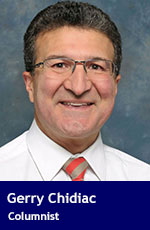 In a recent address on proportional representation (PR), Guy Giorno, one of Stephen Harper’s former strategists, said, “The unassailable moral high ground we (supporters of PR) hold is the people and a result that fairly reflects their will.”
In a recent address on proportional representation (PR), Guy Giorno, one of Stephen Harper’s former strategists, said, “The unassailable moral high ground we (supporters of PR) hold is the people and a result that fairly reflects their will.”
This caused me to pause and reflect. I’ve long been a supporter of PR and now I understand why. First past the post (FPP), our current method of electing representatives to provincial and federal legislatures in Canada, doesn’t reflect the will of the people. The popular vote is often not echoed in Parliament and provincial legislatures.
We know that, and we’re also aware that there are more just ways of holding elections.
It’s true that FPP is simple and it normally results in efficient majority governments. This doesn’t mean it’s right, however.
I’m reminded of a conversation I had many years ago regarding colonialism.
I was working in Zaire, formerly the Belgian Congo and now the Democratic Republic of Congo. My boss was Frank Roelants, a Belgian missionary who had been there since colonial times. He was a man I greatly admired and one who is still highly revered by the people who knew him. This conversation occurred in the early 1990s, more than 30 years after independence. The country was in a state of disrepair and I heard many speak of the “good old days” of colonialism.
At lunch one day, I asked Frank, “Has independence been worth it?”
He looked at me and said, “Gerry, when I arrived here the country was beautiful. There were flowers, the roads were smooth, the phones worked and life was orderly. If you asked an African his opinion, however, he would tell you what he thought the white man wanted to hear.”
He continued, “Today there are no more flowers. The roads are filled with potholes and nothing seems to work. If you ask the opinion of an African, however, he will tell you what he really thinks. So to me, yes, independence has been worth it.” And then he smiled.
Colonialism was wrong. The more closely it’s examined, the clearer that becomes. As the writer and philosopher James Allen said, “The more error is questioned, the darker it grows; it cannot survive the entrance of pure and searching thought.”
With B.C.’s referendum on electoral reform coming this fall, I’ve tried to keep an open mind and listen to views in favour of FPP so I can vote responsibly. I find, however, that all of the arguments I come across are either easily rebutted or simply untrue.
It’s said, for example, that PR will allow fringe groups to take over. In fact, there will be a five per cent threshold that will stop these groups from gaining any power.
It’s said that we will lose local representation. In fact, in all of the PR systems proposed for B.C., everyone will still have at least one local MLA.
It’s said that PR will result in the north losing its voice in the provincial legislature. But one of the options we will vote on is called “rural-urban proportional.” We can choose this if we think it’s best for our province, or even come up with a better option before the next election.
As a professional educator, it’s my role to teach my students about our democratic system and empower them to engage in the positive evolution of our world.
How can I stand before young people and tell them that their opinions matter, and yet vote to keep an electoral system that normally results in a legislature that doesn’t reflect the will of the people?
My conscience dictates that I must vote in favour of proportional representation in the upcoming B.C. referendum. It’s simply the right thing to do.
Troy Media columnist Gerry Chidiac is an award-winning high school teacher specializing in languages, genocide studies and work with at-risk students.
The views, opinions and positions expressed by columnists and contributors are the author’s alone. They do not inherently or expressly reflect the views, opinions and/or positions of our publication.
This site is Powered by Troy Media Digital Solutions


